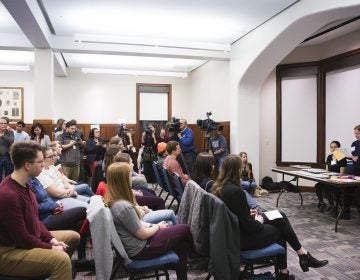Buttigieg, Sanders lead as Iowa releases partial results
The data, made public for the first time nearly 24 hours after voting concluded, reflected the results of 62% of precincts in the state.

Democratic presidential candidate former South Bend Mayor Pete Buttigieg, right, and his husband, Chasten Buttigieg, left, greet people at a campaign event, Tuesday, Feb. 4, 2020, in Hampton, N.H. (Elise Amendola/AP Photo)
The Iowa Democratic Party released partial results of its kickoff presidential caucus after a daylong delay on Tuesday showing former Midwestern Mayor Pete Buttigieg and fiery progressive Vermont Sen. Bernie Sanders leading the opening contest in the party’s 2020 primary season.
The results followed 24 hours of chaos as technical issues marred the contest, forcing state officials to apologize and raising questions about Iowa’s traditional place atop the presidential primary calendar.
It was too early to call a winner based on the initial results, but Massachusetts Sen. Elizabeth Warren, former Vice President Joe Biden and Minnesota Sen. Amy Klobuchar were trailing in the tally of State Delegate Equivalents, according to data released for the first time by the state Democratic Party nearly 24 hours after voting concluded. The results reflected 62% of precincts in the state.
Buttigieg, the 38-year-old former mayor of South Bend, Indiana, becomes the first openly gay candidate to earn presidential primary delegates. His early strength reflects his aggressive political pursuit of rural and small-town voters, including some Republicans, who prefer a more moderate approach to address the nation’s political problems.
“We don’t know all of the numbers, but we know this much: A campaign that started a year ago with four staff members, no name recognition, no money, just a big idea — a campaign that some said should have no business even making this attempt, has taken its place at the front of this race,” Buttigieg declared, his voice filled with emotion, while campaigning in next-up New Hampshire.
While campaigns were eager to spin the results to their advantage, there was little immediate indication that the incomplete results erased the confusion and concern that loomed over the Iowa contest. It was unclear when the full results would be released.
During a private conference call with campaigns earlier in the day, state party chairman Troy Price declined to answer pointed questions about the specific timeline — even whether it would be a matter of days or weeks.
“We have been working day and night to make sure these results are accurate,” Price said at a subsequent press conference.
The leading candidates pressed on in New Hampshire, which votes in just seven days, as billionaire Democrat Michael Bloomberg sensed opportunity, vowing to double his already massive advertising campaign and expand his sprawling staff focused on a series of delegate-rich states voting next month.
The party’s caucus crisis was an embarrassing twist after months of promoting the contest as a chance for Democrats to find some clarity in a jumbled field with no clear front-runner. Instead, after a buildup that featured seven rounds of debates, nearly $1 billion spent nationwide and a year of political jockeying, caucus day ended with no winner, no official results and many fresh questions about whether Iowa can retain its coveted “first” status.
Iowa marked the first contest in a primary season that will span all 50 states and several U.S. territories, ending at the party’s national convention in mid-July.
The other early leader, Sanders, a self-described democratic socialist, has spent decades fighting to fundamentally change the nation’s politics and economy. He has attracted significant support from young voters in particular.
Before he left Iowa late Monday, the Sanders’ campaign told supporters that its internal monitoring showed him in the lead with nearly half the vote in. Sanders himself said late Monday, “Today marks the beginning of the end for Donald Trump.”
Campaigning in New Hampshire on Tuesday, Warren also said she was “feeling good” about her performance in Iowa but questioned the state party’s plans to release partial results.
“I just don’t understand what that means, at least half of the data. I think they ought to get it together and release all the data,” she said.
Biden also said he was “feeling good” and predicted the results would be close.
The party told campaigns Tuesday that the problem was a result of a “coding issue in the reporting system” that it said had since been fixed. It said it had verified the accuracy of the collected data and said the problem was not a result of “a hack or an intrusion.”
A Biden campaign representative objected to the party’s plan to release partial results before checking them against paper records, saying in the conference call that the plan didn’t address “growing reports” about problems on caucus night, such as precinct captains unable to get through on the phone to report results.
“The stories and the problems are just multiplying so presumably you’re going to have some way of addressing that and explaining to us as you release these partial results why you’re comfortable,” Biden campaign attorney Dana Remus said. “You need to have enough transparency that other people feel comfortable about it now and we’re just not there right now.”
Sanders adviser Jeff Weaver thanked party officials, and encouraged other campaigns not to undermine the party.
“Folks who are just trying to delay the return of this because of their relative positioning in the results last night, I think that’s a bit disingenuous,” Weaver said.
For the first time, the Iowa Democratic Party reported three sets of results: a tally of caucusgoers’ initial candidate preference; vote totals from the “final alignment” after supporters of lower-ranking candidates were able to make a second choice and the total number of State Delegate Equivalents each candidate received.
The Associated Press will declare a winner based on the number of state delegates each candidate wins, which has been the traditional standard.
Early polling had suggested Sanders entered the night with a narrow lead, but any of the top four candidates — Sanders, Biden, Warren and Buttigieg — was positioned to score a victory. Sen. Amy Klobuchar, who represents neighboring Minnesota, was also in the running, while outsider candidates including entrepreneur Andrew Yang, billionaire activist Tom Steyer and Hawaii Rep. Tulsi Gabbard lagged behind.
Sensing opportunity amid the chaos, Bloomberg’s campaign announced plans to double its national television advertising spending — which has already exceeded $100 million — as it expands its paid staff to more than 2,000 people.
Bloomberg is looking to next month, having decided to bypass Iowa’s contest and the three other states voting this month in favor of the delegate-rich states in March.
“After more than a year of this primary, the field is as unsettled as ever,” Bloomberg spokeswoman Sabrina Singh said. “No one has made the sale or even come close to it. Meanwhile, Mike is taking the fight to Trump every day, doubling down on the national campaign strategy we’ve been running from the beginning.”
Beyond 2020, the debacle invited fresh criticism about Iowa caucuses, a complicated set of political meetings staged in a state that is whiter and older than the Democratic Party. Many used the moment to question whether it was a quaint political tradition whose time had passed.
The party has tried to accommodate critics before, this year by promising to report three different data points about voters’ preferences, presumably improving transparency. But the new system created new headaches.
“I think Iowa is a dumpster fire,” said Dick Harpootlian, a South Carolina state senator and longtime Biden supporter, who served as an Iowa precinct captain for Biden on Monday.
WHYY is your source for fact-based, in-depth journalism and information. As a nonprofit organization, we rely on financial support from readers like you. Please give today.





